|
*************************************************************************************************************
by Margaret Auld-Louie
 Do you want to know... Do you want to know...
-
Why
Russell
does not look 61 years old?
-
How does
Margaret keep her nice figure?
-
How to get the
healthiest food for your family?
-
Why we buy
food direct from farmers and save money?
Did you know that if you buy food direct from
farmers instead of stores, you can get food that is healthier for your
family as well as better tasting? This is true even if you have been
buying much of your food from the health food store. You can also save
money by buying direct from farmers. However, buying direct from farmers
is different from buying at the supermarket. For instance, not
everything is available all the time. You may need to order food in
advance, sometimes months in advance. But the rewards of buying direct
from farmers are worth the extra effort. Read on for why to buy from
farmers and how it is different than buying from stores.
Better Health
If you are eating supermarket food, the food
is full of toxic pesticides and antibiotics, as summarized in this
graphic:
healthychild.org/farm-to-fork-our-toxic-food-system/.
But while you can avoid these
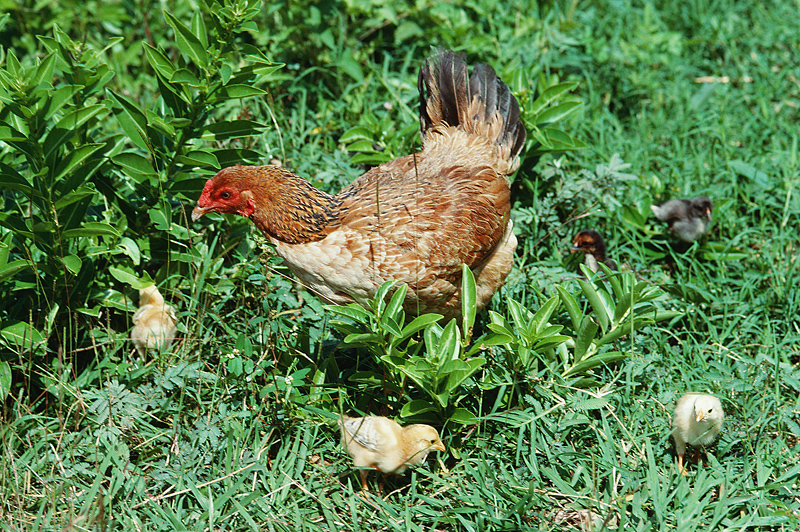 toxic chemicals by buying organic foods,
even much of the organic food found in stores has been raised with
factory farming methods. Organic chickens are still raised in CAFO’s
(Concentrated Animal Feeding Operation), meaning that tens of thousands
of chickens are packed into a barn indoors. When Consumer Reports tested
chickens for bacterial contamination, the organic chickens were even
more highly contaminated than conventional, not surprising given that
they are raised in the same CAFO’s as conventional chickens. Organic and
free range eggs come from chickens raised indoors (“free range” just
means that there is a little door at one end of the barn; not that the
chickens go outside). toxic chemicals by buying organic foods,
even much of the organic food found in stores has been raised with
factory farming methods. Organic chickens are still raised in CAFO’s
(Concentrated Animal Feeding Operation), meaning that tens of thousands
of chickens are packed into a barn indoors. When Consumer Reports tested
chickens for bacterial contamination, the organic chickens were even
more highly contaminated than conventional, not surprising given that
they are raised in the same CAFO’s as conventional chickens. Organic and
free range eggs come from chickens raised indoors (“free range” just
means that there is a little door at one end of the barn; not that the
chickens go outside).
Organic foods can be factory farmed, just like
conventional—what writer
Michael Pollan calls “industrial organic” in
his book
The Omnivore’s Dilemma. The problem with factory farming is
that raising plants or animals on such a large scale makes it difficult
to raise them in a way that is healthy for them or that maximizes the
nutrients in the food. What matters is increasing production while
minimizing cost. For instance, vegetables and fruits need to hold up to
mechanized harvesting. Also, the food needs to be suited for
long-distance transportation. This may mean growing varieties of fruits
or vegetables that are low in nutrients but hold up to this handling.
Animals need to grow as quickly as possible but the varieties that grow
fastest may not be the healthiest for us to eat.
Factory-farmed animals, including organic, may
be raised indoors, or fattened in a feedlot, so that they are not eating
the diet nature designed for them. Therefore, when you eat them, the
animals are not as healthy for you, either. For example, chickens are
omnivores but when raised indoors cannot eat the bugs and small animals,
in addition to grasses, that nature designed them to eat. Cattle
fattened in feedlots on soy and corn are eating an unnatural diet that
would kill them if they were not slaughtered after a short period in the
feedlot. are not eating
the diet nature designed for them. Therefore, when you eat them, the
animals are not as healthy for you, either. For example, chickens are
omnivores but when raised indoors cannot eat the bugs and small animals,
in addition to grasses, that nature designed them to eat. Cattle
fattened in feedlots on soy and corn are eating an unnatural diet that
would kill them if they were not slaughtered after a short period in the
feedlot.
If you have a sensitive body, you may even be
able to tell the difference in the healthfulness of foods raised
differently, by how your body feels when you eat it. For instance,
sometimes I feel sick when I eat eggs, even organic, “free range” eggs
from the health food store. But if I eat eggs bought direct from
farmers, where the chickens are raised outdoors in pasture, I do not feel
sick. I also feel better when I eat grass-fed, pastured meats, where the
animals spend their entire life outdoors on pasture, vs. the “natural”,
“organic” meats from the health food store. Unless marked as “grassfed”
or “pastured”, the store meats have been raised indoors or finished in
feedlots. Even most bison (buffalo) is finished in feedlots.
Better Taste
Besides being healthier for you, food grown by
small, local farmers usually tastes better than factory- farmed food. One
reason is that small farmers can grow varieties that taste better,
rather than having to raise varieties built to withstand the rigors of
mass production. They may even grow what are called “heirloom” varieties
of plants or animals, varieties that are never factory-farmed because
they cannot be easily mass-produced. These heirloom varieties are often
much higher in nutrition and taste. farmed food. One
reason is that small farmers can grow varieties that taste better,
rather than having to raise varieties built to withstand the rigors of
mass production. They may even grow what are called “heirloom” varieties
of plants or animals, varieties that are never factory-farmed because
they cannot be easily mass-produced. These heirloom varieties are often
much higher in nutrition and taste.
Better taste can also indicate that the food
contains more nutrients and is healthier for you. Small farmers may
apply more nutrients to the soil, since they are concerned with quality
of product and the health of the vegetables, not just maximizing
production for minimal cost. They may have a mixed-used farm of
vegetables and animals, meaning they can use the manure from their
animals to fertilize the vegetables. Of course, large scale organic
farms may use manure, too, but where does it come from? Does it come
from factory-farmed animals? If so, the quality of the manure will be
lower, since the animals were not as healthy.
In my experience, food from the smallest farms
often tastes the best. For instance, a farm supplying 100 CSA (Community
Supported Agriculture) members may taste better than a farm supplying
5,000 CSA members plus 20 health food stores or 40 farmer’s markets.
Obviously the second farm is producing on a much larger scale, and the
quality sometimes suffers due to that, though it will probably still be
better than food from a giant organic conglomerate that supplies the
whole nation with food.
The best-tasting eggs I have had came from farms
with around 100 chickens out
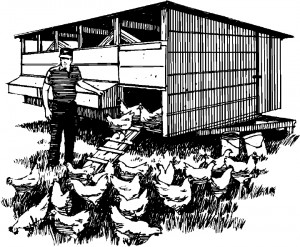 on pasture, not farms with thousands of
chickens, though it is possible to produce excellent eggs from thousands
of chickens if you have sufficient land to rotate them on. Some farmers
will stick chickens outside in dirt pens and call them “pastured”, but
their eggs will not taste as good as chickens running around on true
pasture, eating bugs and grasses. on pasture, not farms with thousands of
chickens, though it is possible to produce excellent eggs from thousands
of chickens if you have sufficient land to rotate them on. Some farmers
will stick chickens outside in dirt pens and call them “pastured”, but
their eggs will not taste as good as chickens running around on true
pasture, eating bugs and grasses.
Meats from animals raised 100% on pasture also
tend to taste better. Now that I am used to eating pastured meats at
home, I often have a hard time choking down the bland, tasteless meat
from stores or restaurants that have not been pasture-raised. Animals
raised on lush, healthy pastures are taking in more nutrients than their
feedlot counterparts, leading to both better tasting and healthier meat.
Feedlot animals would typically only be given the minimal nutrients
needed to make them grow, not all the nutrients they need to be healthy.
Lower Cost
As anyone who has sought out grass-fed,
pastured meats knows, buying these meats in stores is very
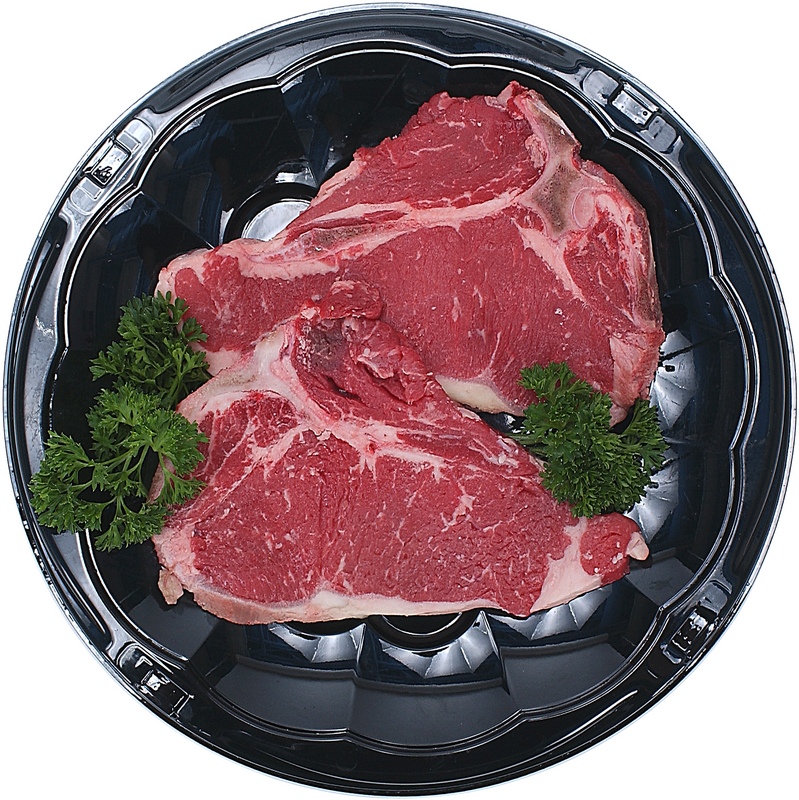 expensive.
Even buying meat at farmer’s markets can be cost-prohibitive if you are
buying single cuts. However, if you invest in a large freezer and buy
meat in bulk, you can reduce the cost per pound to an affordable amount.
It will still be more than conventional meats but may often cost less
than the “organic” or “natural”, non-pastured meats at the health food
store. Then you can plan meals from your freezer instead of having to
run to the store every week. expensive.
Even buying meat at farmer’s markets can be cost-prohibitive if you are
buying single cuts. However, if you invest in a large freezer and buy
meat in bulk, you can reduce the cost per pound to an affordable amount.
It will still be more than conventional meats but may often cost less
than the “organic” or “natural”, non-pastured meats at the health food
store. Then you can plan meals from your freezer instead of having to
run to the store every week.
Likewise, if you sign up for a vegetable share
thru a CSA, that can be more
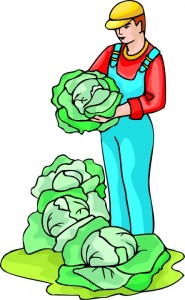 affordable than buying vegetables at the
farmer’s market or health food store. The concept of a CSA is that you
pay in advance for a whole season of food, becoming a member of the farm
and you get a “share” of the vegetables produced. In my experience, the
vegetables may also be fresher and better quality than what I find at
farmers’ markets. affordable than buying vegetables at the
farmer’s market or health food store. The concept of a CSA is that you
pay in advance for a whole season of food, becoming a member of the farm
and you get a “share” of the vegetables produced. In my experience, the
vegetables may also be fresher and better quality than what I find at
farmers’ markets.
If you’re used to buying conventional food at
the supermarket, you may not understand why food direct from farmers
costs more. Supermarket food is cheaper for several reasons:
-
Much
factory-farmed food is subsidized by the government, especially the
corn and soy that are used to feed animals.
-
Small farmers
producing food in small quantities don’t have economies of scale.
The mass production of factory farms makes cheap food possible.
-
Small farmers
typically use higher-quality food for their animals and higher
quality nutrients for the plants, which cost more. For instance,
organic,
non-GMO (genetically modified) feed may cost several times
what conventional feed costs.
-
Small farmers
may be growing heirloom varieties of plants and animals, which grow
more slowly and therefore cost more to produce (but have better
taste and nutrition).
Do not assume a farmer is gouging you because
they are charging $6 or $7 a dozen for pastured eggs.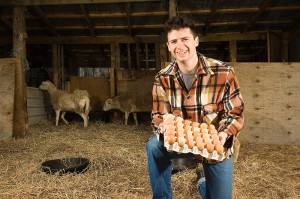 Unless you know
all the farmer’s costs and how they do their farming, you can’t make a
fair judgment about what price they should be charging. Most farmers I
know are just trying to cover their costs and are not getting rich.
Farmers raising chickens outdoors have losses due to predators,
something not encountered by farmers raising chickens in CAFO’s. Even
farmers charging what seem like high prices may have difficulty covering
their costs. For example, I used to get raw goat milk from a farmer who
charged $75/month for a share (1 gallon/week). That is quite a high rate
but despite that, she could not make a living and went out of business. Unless you know
all the farmer’s costs and how they do their farming, you can’t make a
fair judgment about what price they should be charging. Most farmers I
know are just trying to cover their costs and are not getting rich.
Farmers raising chickens outdoors have losses due to predators,
something not encountered by farmers raising chickens in CAFO’s. Even
farmers charging what seem like high prices may have difficulty covering
their costs. For example, I used to get raw goat milk from a farmer who
charged $75/month for a share (1 gallon/week). That is quite a high rate
but despite that, she could not make a living and went out of business.
In a talk by
farmer Bill Hyde of Happy Farm on the Sustainability of Farming, at the
Denver Chapter of the
Weston A. Price Foundation in July 2013, I learned
more about the costs that small farmers encounter when raising food. He
did a detailed analysis of the cost to raise a dozen pastured eggs,
factoring in all the costs that we do not think about, such as land,
labor, utilities, transportation, supplies, etc. Using conservative
figures for all the costs, he calculated a cost of $12.07 (including the
carton) to raise and sell a dozen pastured eggs. No farmer charges that
much for pastured eggs. At most, they charge $7/dozen. How do they
recoup their costs, then? As Hyde explained, for a small farmer to be
economically viable, they need one of the following:
-
They have a
“day job”
-
Their
partner/spouse has a “day job”
-
Volunteers
work at the farm
-
They have
money from grants
-
They inherited
the land (as in the case of famous farmer,
Joel Salatin)
I recently talked
with another small local farmer, who runs the
Mini Moos and Kids Too!
goat dairy. He produces pasteurized goat milk, cheese and duck eggs. He
has 90 goats in his dairy. He told me he works a 40 hour/week outside
job, then spends evenings and weekends making cheese and going to
farmer’s markets to sell his products. His wife spends 8 hours/day every
day just milking the goats. She also provides all the care of the goats
and does all the bookkeeping. The farmer said he gets about 3 hours
sleep/night between running the farm and working his job. Somehow he
manages to stay healthy despite this.
I hear similar stories from other farmers I
talk to—in almost every case, one member of the couple is working an
outside job to bring in income. In the case mentioned above of the raw
goat milk farmer who went out of business, she was divorced, so had no
partner to help support the farm. The
Weston A. Price Foundation says
that farmers can make more money by selling value-added products, such
as butter, cheese and yogurt made from raw milk. But local laws may
prohibit this. In the state of Colorado, where I live, only raw, fluid
milk is legal. Farmers in Colorado cannot legally make products from raw
milk and sell it.
Depending on what part of the country you live
in, costs for farmers may vary, due to climate, vegetation or the local
economy. In Colorado where I live, it’s difficult to raise chickens due
to the harsh climate (chickens are descended from jungle fowl, so don’t
do well with either snow or very hot, dry weather). We have grown
accustomed to cheap chicken from the supermarket, but it has taken
CAFO’s to make cheap chicken possible. Prior to that, chicken was the
expensive meat, only served for special dinners. In Colorado it’s
difficult to even find pastured chicken, and most of it is very
expensive. So, if cost is a consideration, keep in mind that the
cheapest pastured meat will be from the largest animals—beef, bison and
pork—if bought in bulk (quarter, half or whole animal).
The most common complaint we hear is that all
the above is too expensive. So is medication for diabetes, high blood
pressure and high cholesterol and their subsequent side effects. One can
spend even more money on treating obesity and weight loss/dieting that
never keep the weight off five years later. The choice is up to you.
We have made our choice.
If you want to know the "wholistic" food
principles we follow and the holistic research we used to educate
ourselves, get a copy of our e-Book, Secrets of Longevity: Optimum
nutrition for people, free this month
with any order.
To be continued in Part 2:
Margaret Auld-Louie was raised on
supermarket food in an suburban environment, so she had to make a total
mental shift when she started buying food direct from farmers. She is
the resource list editor for the
Denver chapter of the Weston A. Price
Foundation and enjoys meeting farmers and finding new sources of
healthy foods.
|
